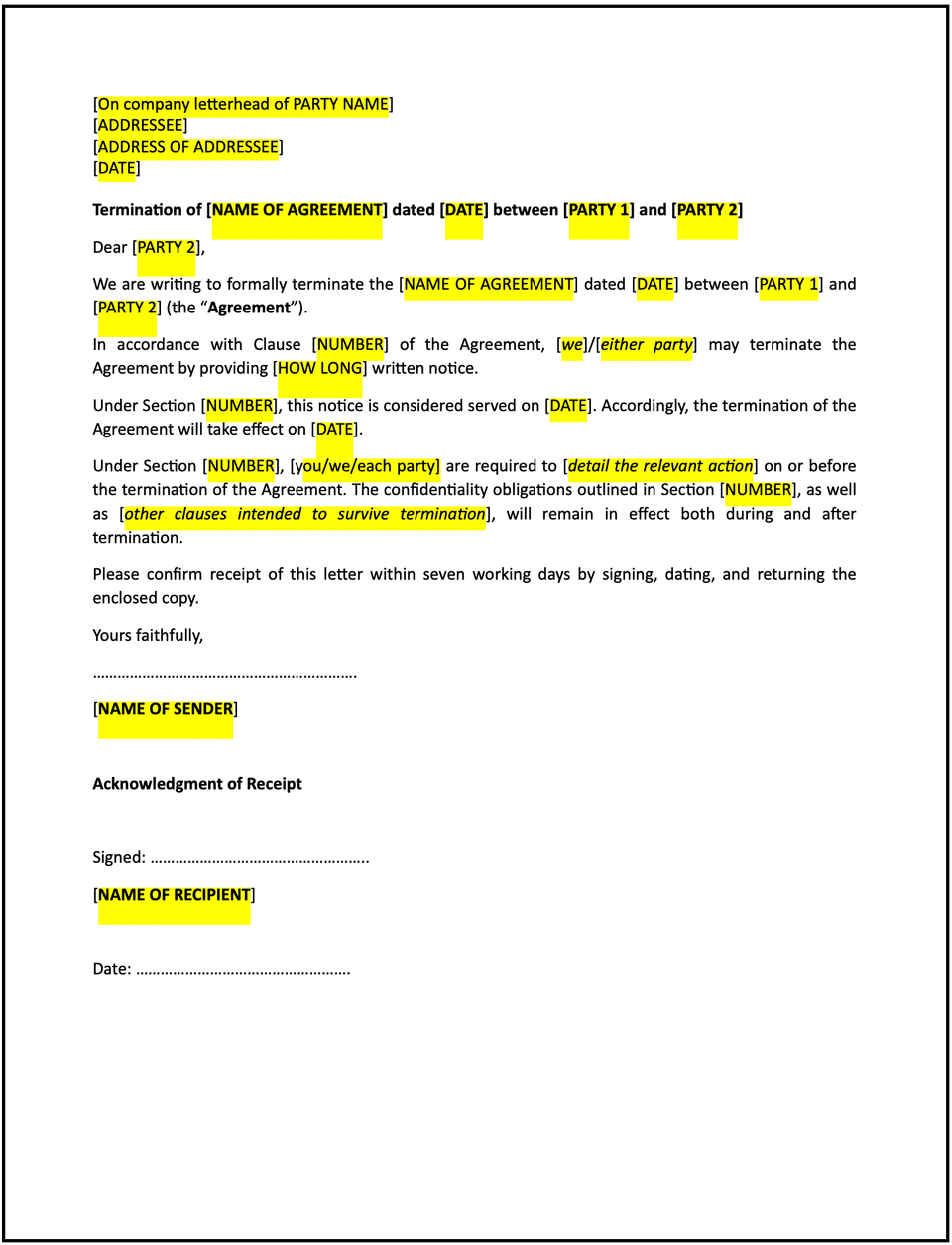Letter of termination of contract for convenience: Free template

Letter of termination of contract for convenience
Terminating a contract for convenience allows one party to end the agreement without alleging a breach or fault by the other party. This letter provides a professional way to notify the other party of the termination, outline the effective date, and address any final obligations while maintaining a respectful tone.
How to use this letter of termination of contract for convenience
- Reference the contract: Clearly identify the contract, including its title, reference number, and the parties involved. Reference the specific termination for convenience clause, if applicable.
- Confirm the termination: Clearly state the intent to terminate the contract and specify the effective termination date as per the agreement’s terms.
- Address final obligations: Outline any remaining responsibilities, such as final payments, delivery of goods or services, or return of property.
- Acknowledge the relationship: Maintain a positive tone by recognizing the work completed or the contributions made under the agreement.
- Maintain a professional tone: Ensure the letter is respectful and factual, focusing on concluding the agreement amicably.
- Request acknowledgment: Ask the other party to confirm receipt of the letter and agree to any final steps if required.
Benefits of using a letter of termination of contract for convenience
This letter template provides a clear and professional way to terminate a contract for convenience while maintaining respect and transparency. Here’s how it helps:
- Ensure compliance: By referencing the termination clause, the letter confirms the termination aligns with the contract’s terms.
- Maintain professionalism: A respectful and factual tone helps preserve goodwill and reduces the risk of disputes.
- Address final actions: Confirming any remaining obligations ensures a smooth and organized conclusion to the agreement.
- Provide documentation: The letter serves as a formal record of the termination, which is useful for legal or auditing purposes.
- Minimize misunderstandings: Clearly outlining the termination details ensures both parties are aligned and aware of next steps.
Tips for writing an effective letter of termination of contract for convenience
- Be specific: Clearly reference the contract, the termination clause, and the effective termination date.
- Address final obligations: Specify any remaining responsibilities or actions to ensure all terms are fulfilled.
- Use professional language: Maintain a respectful and solution-oriented tone, emphasizing compliance with the agreement’s terms.
- Acknowledge contributions: Briefly recognize the value derived from the agreement to preserve goodwill.
- Keep it concise: Focus on the key points and avoid unnecessary details that could detract from the main message.
Frequently asked questions (FAQs)
Q: What details should I include in this letter?
A: Include the contract reference, the effective termination date, reference to the termination for convenience clause, and any final obligations.
Q: Do I need to provide a reason for termination?
A: Typically, a termination for convenience does not require a reason, but you may include one if it helps maintain the relationship.
Q: Who typically receives this letter?
A: Send the letter to the other party or parties involved in the contract, typically their legal or operational representatives.
Q: How formal should this letter be?
A: The tone should be professional and respectful, reflecting the importance of maintaining a positive relationship.
Q: When should this letter be sent?
A: Send the letter promptly and in accordance with any notice period required by the contract’s terms.
Q: Can this letter address final payments?
A: Yes, if the contract includes obligations for final payments or refunds, these should be outlined in the letter.
Q: Is this letter necessary for verbal agreements?
A: Yes, confirming termination in writing is important to formalize the agreement and provide a clear record.
This article contains general legal information and does not contain legal advice. Cobrief is not a law firm or a substitute for an attorney or law firm. The law is complex and changes often. For legal advice, please ask a lawyer.


